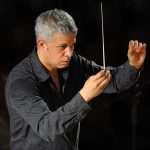Alexander Walker: Travels with Elgar
It was a hot day in 1998, and this was my first trip to Moscow. At the time, I was studying with the then nonagenarian legendary conducting pedagogue Ilya Musin at St. Petersburg State Conservatoire. Two days before, I had made my debut in the theatre of the conservatoire conducting the Marriage of Figaro (sung in Russian!) and took a fast train from there to Moscow still high on the adrenaline to get my Belarussian visa. I was on my way to Minsk where I would conduct the Belarussian premiere of Elgar’s wonderful Enigma Variations with the National Philharmonic to mark the Queen’s Birthday. This was to be my debut working with a professional orchestra.
The week was one I shall always remember. The orchestra had not previously played any music by Elgar and they responded to its passion, falling in love with it immediately. My visit was only marred by the expulsion of the British Ambassador (whose guest I was in Minsk!) by the country’s president Alexander Lukashenko who was quickly consolidating his grip on power and falling out with foreign diplomats at every opportunity. I wondered whether Elgar or I might have somehow been to blame – the president had been invited to the concert… On my return to St. Petersburg, I was delighted to be able to show my professor a copy of the local newspaper, showing a photograph of him conducting the orchestra in the late 1930s (where he had been Music Director) alongside one of his pupil 60 years later conducting the music of Edward Elgar.
Little did I know this was to be the first stage in a voyage of discovery that continues many years later. Elgar is a composer whose music I feel a great debt both musically and personally. A few weeks ago, the work I have done over the years to spread the word about his music was recognised by the Elgar Society who awarded me the Elgar Medal, which over the years has been given to many very distinguished musicians, including Yehudi Menuhin, who of course made the most famous recording of the violin concerto with the composer himself conducting.
Most countries are very proud of their greatest composers, whether it be the Finns of Sibelius, the Polish of Chopin and the Russians of Tchaikovsky. In my mind this is largely a good thing. For some reason, the British are not so good at shouting about their great composers, and perhaps this is part of the reason why Elgar’s music is not better known in some parts of the world. I have therefore been very lucky to have the opportunity to introduce much of Elgar’s music – the symphonies, the violin and cello concertos, Falstaff and some of the lesser-known music too in many places where it is hardly known at all – through-out Russia, Romania, the Balkans, Turkey and elsewhere. With each performance, the emotional experience deepens. My experience also continues to show that Elgar is a truly great composer.
It is always striking how quickly musicians, particularly those from central and Eastern Europe warm to Elgar’s music and are able to “get under their skin”. Such orchestras often focus on a narrower repertoire than in the English-speaking world, concentrating largely on Romantic repertoire. Because of this, players especially in the string sections have what might seem to us a more “old-fashioned” sort of sound, making a luscious full sound when appropriate and utilising techniques such as portamento (where two notes are joined together expressively, rather like a singer might do). This approach is particularly appropriate for the kind of expression required by Elgar and gives the performances an air of authenticity.
In my view, Elgar orchestrates as well as anybody, and no other composer is able to write better for strings. The way he voices a harmony has an astonishing degree of depth and subtlety. He has a unique ability to write a line to be played on a particular string which is completely tailored to the expression and somehow imbues it with the singing quality of the human voice.
My work has taken me to some extraordinary parts of Europe that many people never have the opportunity to visit. My experiences in such places have been incredibly rich and I have begun many friendships which will last me a lifetime. Whether it be in Transylvania, the Black Earth region of Russia or by a warm Mediterranean Sea in Turkey, many of these friendships have been cemented by the extraordinarily life-affirming music of Edward Elgar. Recently, I have particularly enjoyed conducting the composer’s violin concerto, a kind of symphony for violin and orchestra, giving the Albanian premiere with the Albanian British violinist, Alda Dizdari. We performed the work together many times and felt we were really able to discover many of its secrets. Somehow, though, however good the performance, you are always left feeling there is something you could do better.
It felt a little like coming home, when I was asked to conduct the Elgar Birthday Concert in the composer’s home town of Malvern a couple of years ago, with the Royal Philharmonic Orchestra in which I conducted a programme which included Froissart Overture, the cello concerto and, of course, Enigma Variations. There is no orchestra which knows this music and its associated traditions better than they. I have just had the pleasure of introducing this work to the young musicians of the Surrey County Youth Orchestra in the UK, who, in contrast were all playing the piece for the very first time. I am very much looking forward to my next adventures with the music of Elgar which will include a performance of the symphony no. 2 with the Moldova Philharmonic in Romania in February and the Introduction and Allegro for Strings with Musica Viva in Moscow.



